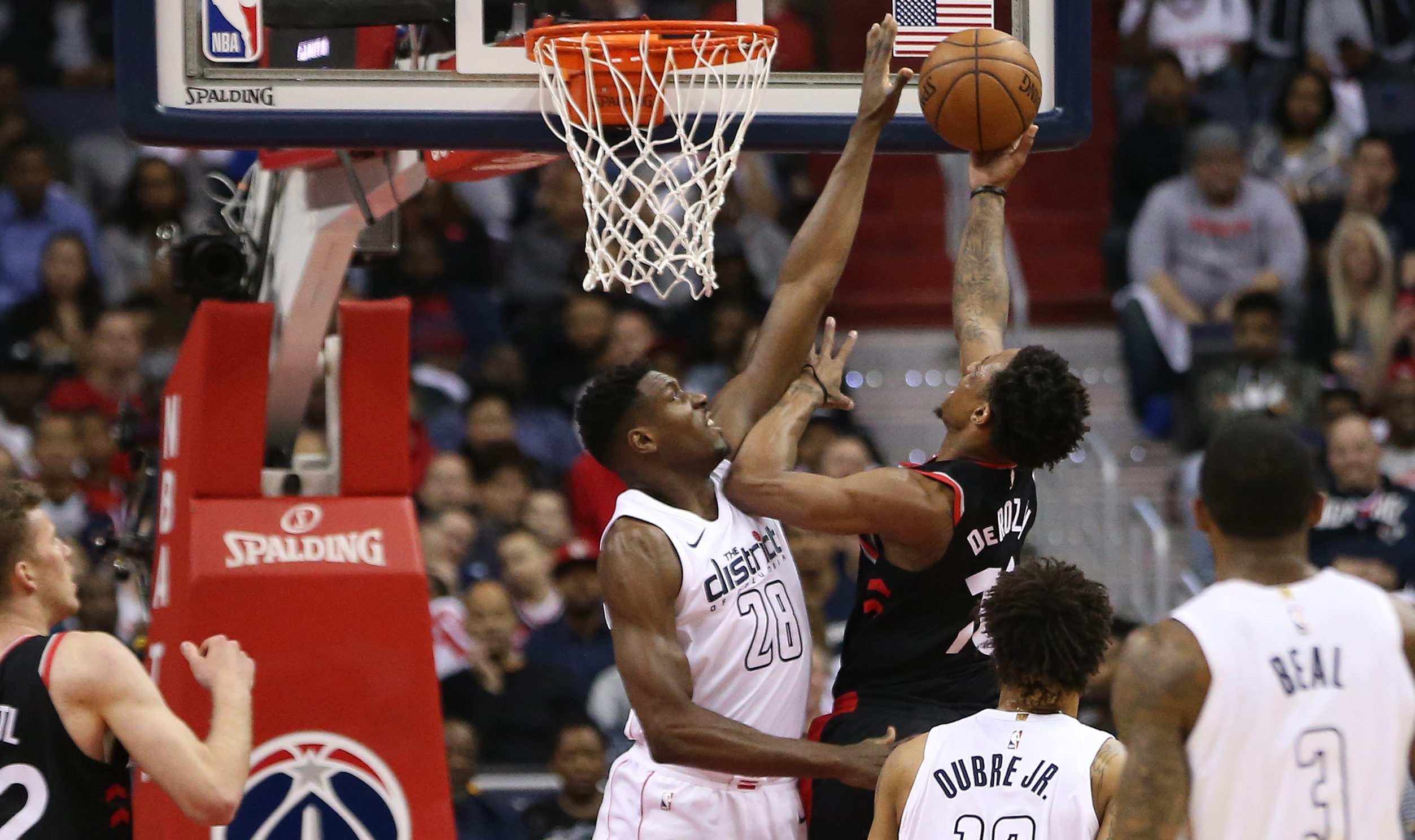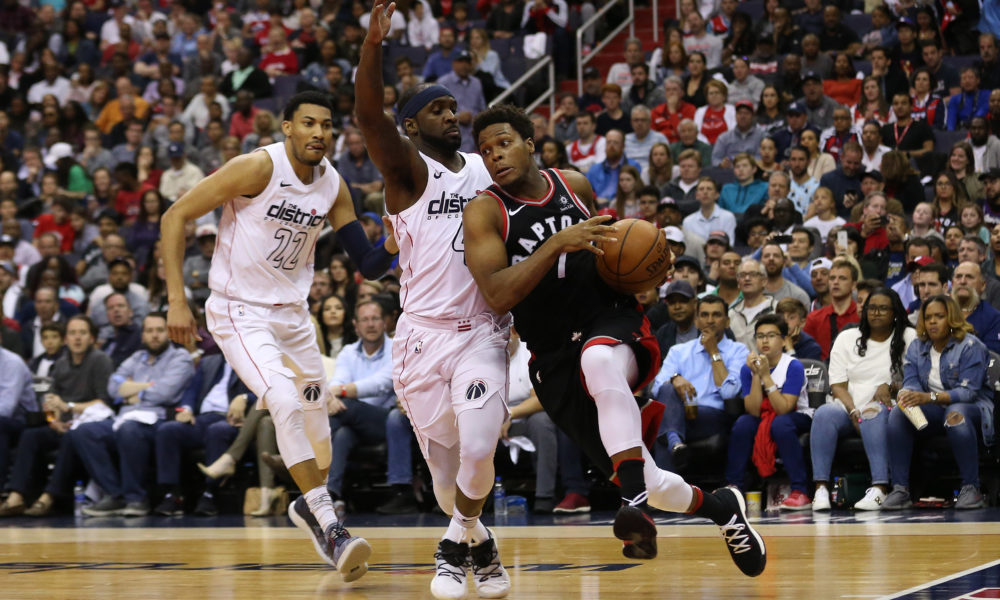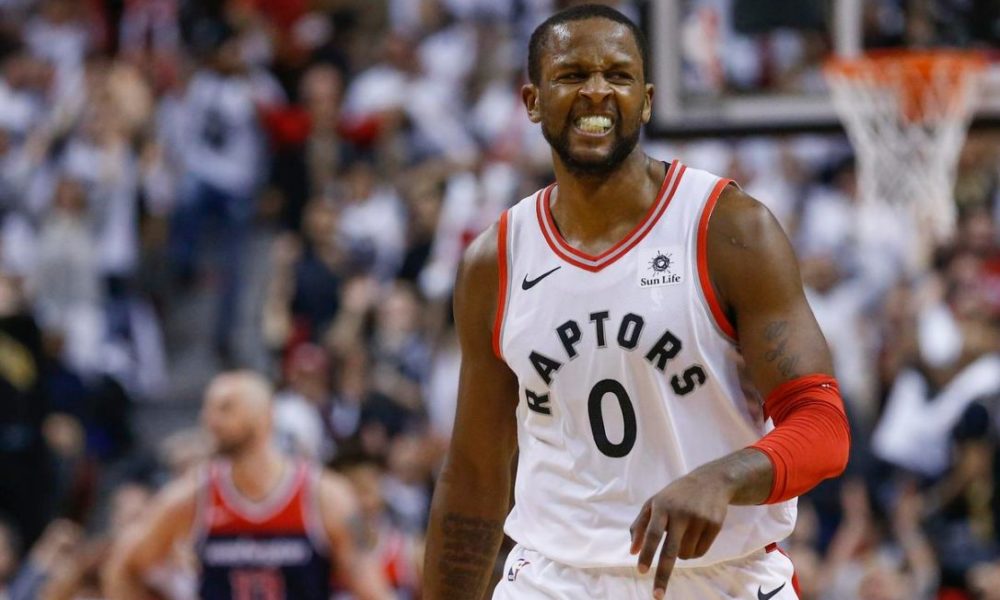Raptors 98, Wizards 106, Series tied 2-2 | Box Score | Quick Reaction | Post-game news & notes | Reaction Podcast
“Following familiar patterns, I’m falling back into ruin” – Pup
What was the point?
This is alarmist, and rhetorical, and entirely premature. There is a lot of playoff series left. That question is coming, though, if the Toronto Raptors turn in another performance like they did on Sunday in a wholly dispiriting 106-98 loss to the Washington Wizards. The game sends the Raptors back to Toronto with two days to stew in back-to-back shaky performances, and it hopefully sends them back to Toronto in deep introspection as to what they want to be from here.
Because for two games, the Raptors were who they were for 82 games. The ball was moving, the threes were going up without hesitation, and despite some stumbles and shortcomings, the type that ebb and flow naturally in a seven-game series, the Raptors won a pair of games leaning on their reset style of play. It was good, and it was encouraging, and logic would have dictated that it further galvanized the new style’s hold on the roster. Game 3 was bad, but it was bad in the way that, while frustrating and stripped of value from a learning perspective because of the blowout nature, isn’t alarming in the grand scheme. Doubling down on that loss with an even worse one – much closer in score and game flow but far less explicable from an execution standpoint – is a dangerous look.
The Raptors lost in exactly the way they’ve spent the last 12 months working to avoid. Washington has toned down their traps and blitzes as the series has gone on, switching more often and making a pair of bets: That they’re better off with Toronto’s stars trying to beat them one-on-one and taking role players out of the game, and that the Raptors will get rattled enough to commit turnovers, buoying what hasn’t been an incredibly effective Wizards half-court offense. On Sunday, those bets paid off tremendously. The Raptors tallied just 19 assists, shot just 18 threes – shot, after hitting 16 in Game 1 – and a tightened nine-man rotation somehow saw only two players crack an average usage rate, one of whom, Jonas Valanciunas, was limited to 15 minutes (in part because of early foul trouble) despite being a key part of Toronto’s best sustained runs in the series. Instead, this was the worst parts of the 2014-17 Raptors, with DeMar DeRozan using nearly half of the offensive possessions while on the floor, Kyle Lowry chipping in efficiently but modestly, and role players either freezing up or making the wrong plays when finally called upon.
This isn’t the Raptors. Or it’s not supposed to be, anymore.
And it wasn’t to start. For the fourth consecutive game, the Raptors got out to a strong start, built an early lead, and forced Scott Brooks to burn a timeout in the opening minutes. Washington came out willing to take all kinds of low-efficiency mid-range looks, and Toronto’s strategy of keeping Washington off the 3-point line continued to hold. All five Raptors scored in the first few minutes, including a nice cut and then a steal for a dunk for OG Anunoby, who was once again great in the first half, and a Lowry pull-up three in transition that usually bodes well for the offense. Even DeRozan, who missed his first five field-goal attempts, was getting to the line at will, leading a Raptors’ transition charge that really had Washington on their heels off of misses.
“The first stop we got we were aggressive, just pushing it,” DeRozan said. “That’s when we are at our best. That is when we have been at our best all year for myself and us as a team. We were just out there being aggressive we then we got away from that. Once away from that we got a little bit stagnant.”
That dissipated quickly. Valanciunas got into foul trouble (including a flagrant called to the letter and not at all the spirit of the rule), the Wizards downsized, and the Raptors’ turnover issues from earlier in the season reared their head. The Raptors were up eight after a quarter despite not having played particularly well outside of their half-court defense, with five turnovers and four offensive rebounds surrendered precluding them from Game 2-style pull-away. Dwane Casey went to the Lowry-and-bench unit atop the second, indicative of strong rotations from him all first half around the team’s foul trouble, and Brooks quickly responded by extending minutes for John Wall (he played 43 on the night). Wall was hot enough that Pascal Siakam even got a crack at him as a cooler and looked good. When Delon Wright back-pedaled in transition and spiked a Wall layup attempt to key a great Siakam dunk the other way, it looked like Toronto had weathered the worst. They were up 10, the full contingent of starters was returning, and the Wizards were scoring barely half a point per-half court possession. That lead would reach 11 at halftime.
Things went awry from there. It only took a couple of minutes of losing the Wizards at the 3-point line for Bradley Beal to get hot and Otto Porter to make his first offensive appearance of the series, and a 10-0 Wizards run erased all the work Toronto had done earlier. A brief counter-push from the Raptors fizzled out quickly, Anunoby looked slowed by a rolled ankle from the second quarter, and DeRozan’s decision-making fed the team’s ill composure.
“It felt like we were up and aggressive, up into them. We made them take tough shots,” Jakob Poeltl said. “To start the second half, I know Bradley Beal had a couple easy ones and Otto Porter had a couple easy ones. They got going. We can’t let that happen. We know they have a lot of good shooters out there. We can’t let them got hot.”
The Raptors tried going small, which gave a quick spark before turnover issues settled back in, some of them comically bad. DeRozan stuck a pair of jumpers late to try to stay ahead, and Mike Scott answered by beating the buzzer to send the game into the fourth tied.
“We didn’t sustain it. We have to do it for longer periods of time, more people have to sustain it,” Casey said. “Again our bugaboo was our turnovers, inexplicably some of them. You can’t explain them. They’re out of character. We’re have fastbreaks going down and we throw it out of bounds.”
Brooks left nothing to chance, playing both Wall and Beal to start the fourth with the clear intention of playing them the entire quarter. The Lowry-and-bench unit provided Toronto’s last solid push, getting inside against a Wizards lineup lacking rim protection. A 10-2 run looked like it could snowball when Beal picked up his fifth, but Beal stayed on the floor and teamed up with Wall for consecutive jumpers. The game tied with under five minutes to go, a gift of a sixth foul on Beal gave the Raptors what should have been a clear upper-hand for the close-out. Instead, Beal shook off a quick tantrum and instead became a vibrant cheerleader, with Wall’s steely demeanor helping keep the Wizards composed. Toronto’s offense devolved completely, with DeRozan using the bulk of the offensive possessions, the ball not moving freely and, when it did, the players around him not making the right plays – Wright passed up good looks, Serge Ibaka made curious decisions at the top of the floor, and Poeltl, who’d been strong all night, appeared gassed before fouling out.
“They get to sit in their shell defense and the guy with the ball has got the other four guys eyes on him because there’s not a lot of movement and things like that,” Miles said. “It makes it tough. We’ve got to do everything with purpose and carry a threat in every part of the play. And I don’t think we did that.”
Vintage DeMarre Caroll quote right there. And it was fitting, because the Raptors of the last six minutes looked like the Raptors of the last three postseasons. DeRozan got some tunnel-vision he took the blame for afterward, Lowry wasn’t aggressive enough in helping change that, Casey didn’t push the right buttons to find a good closing mix, and the entire team just tightened up. They’d manage six points over the final five minutes, not only giving Washington the win but a cause to enjoy themselves and rally around how they’ve now fought through serious adversity in a game.
“We couldn’t execute. Myself I took some bad shots that led to them getting out in transition and some easy buckets,” DeRozan said. “We put them on the free throw line and they executed and we couldn’t get a stop and couldn’t get a bucket. Like I said, I took some bad shots I would like to have back, but we just have to watch film, understand what we have to do, understand how much better we have to be especially in late-game situations.”
The Raptors would probably like to have a lot of that back. This was a game in which they played a terrific first half defensively and got out to a great start and then proceeded to get in their own way time and again, carelessness and imprecision and apparent distrust in a system that won them 59 games and the first two of this series all sticking out as elements that are no longer supposed to belong. You’re going to lose games in a tough playoff series against a good team, you’d just prefer the other team to genuinely beat you rather than tripping on your own feet.
“This one was tougher because I thought we had it under control,” Casey said.
It’s possible this is a blip. The Raptors have strayed from their new, egalitarian path for small stretches in the past and found their way back. Losing ugly and losing wrong are pretty good reminders that the course needs correcting, and at this point, the sheer number of failures doing things the old way should have been enough to coax an attempt at failing differently or, hey, succeeding. It’s true that Washington has changed up its defense and the Raptors have always been better adjusting between games than within them, and that the Raptors are trying to find rotations and closing lineups without Fred VanVleet, who they expected to play a very large role here. It’s also true that in unnecessarily exploring this reminder of who they used to be, they have used up all of their margin for error in the series. The jokes about each successive game being another Game 7 can get ratcheted up again now, because Wednesday will be as close to a must-win as a non-elimination game gets, given the historical importance of a Game 5 coming out of a 2-2 split.
“The pressure is on them,” Porter said.
They need to be new again.



